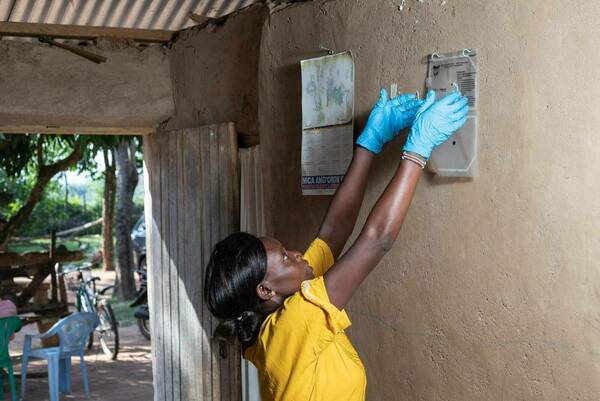Using anti-racist messaging boosts credibility of human rights groups, Notre Dame study shows
How can human rights groups criticize governments' human rights violations without appearing racist or fueling racism toward diaspora groups? New research by a University of Notre Dame human rights expert sheds light on the complex relationship between race and human rights, especially as it plays out between human rights groups and governments.
“If public criticism by a human rights group, known as shaming, could be perceived as racist, it could threaten these organizations’ impartial, unbiased reputations,” said Zoltan Búzás, associate professor of global affairs at the University of Notre Dame’s Keough School of Global Affairs. “Maintaining a reputation for fairness is critical for enabling these organizations’ important work: raising funds, recruiting volunteers and mobilizing Americans to pressure their representatives against human rights violations.”
In a study published in the American Journal of Political Science, Búzás and Lotem Bassan-Nygate of Harvard University found that when shaming by human rights organizations, such as Amnesty International, included anti-racist cues denouncing racism, survey respondents perceived the shaming as less racist. For example, a February 2022 Amnesty report labeling Israel an “apartheid state” but condemning antisemitism and clarifying that its criticism was aimed at the government, not Jewish people, reduced perceptions of racism by 5 percent when compared to a report with no anti-racist cues.
“Human rights organizations should seriously consider emulating Amnesty’s use of anti-racist cues in shaming messages,” Búzás said. “Although shaming with such cues is slightly less effective at mobilizing the public against human rights violators than shaming without cues, the price seems worth paying to lower perceptions of racism.”
The researchers conducted two U.S. survey experiments involving nearly 7,000 respondents and interviews with 11 individuals from the prominent human rights organizations Amnesty International, Oxfam and Human Rights Watch. Survey results showed that shaming of the Israeli and Chinese governments for human rights violations reduced support for the governments themselves but did not increase antisemitism or anti-Asian sentiment.
“If shamers face a racial dilemma, it is less about how to shame without fueling racism, and more about how to shame without appearing racist,” said Búzás, though he noted that more research is needed to explore the issue of fueling racism among diasporas.
The researchers also investigated “countershaming” — when targeted governments accuse human rights organizations of racism — and found that governments can partially win back foreign support by making accusations of racism.
In the case of China, for example, racial countershaming by the Chinese government increased overall support by nearly 3 percent, almost completely eliminating the adverse effects of shaming.
Búzas recently shared the study’s findings with several prominent human rights organizations in a meeting at the Keough School’s Washington Office. Future research on this topic should explore additional tactics for minimizing perceptions of racism beyond anti-racist cues, Búzás said.
“These cues are just one instrument,” he said. “Organizations could also look into internal reform such as diversifying their staff and their boards, creating strong accountability mechanisms and embracing inclusive organizational cultures. This question of developing and protecting a good reputation came up repeatedly and deserves more sustained study. Ultimately, however, human rights organizations should strive to become genuinely anti-racist organizations, rather than simply engage in superficial reputation management.”
Research was funded by the Klau Institute for Civil and Human Rights and the Keough School of Global Affairs.
Originally published by at keough.nd.edu on Dec. 20.
Latest Research
- NSF Cyber SMART’s fall meeting shapes fifth year of project, legacy and future plans, and adds new memberThe U.S. National Science Foundation (NSF) Cyber SMART center gathered for its fall meeting on the University of Notre Dame campus this September. The meeting served as a checkpoint with progress reports and new projects from research leads and students…
- Slavic and Eurasian studies professor wins Humboldt fellowship to research how Russia’s religious past shapes its presentWhen Russia invaded Ukraine on Feb. 24, 2022, Sean Griffin realized his second book needed a new title. Griffin, an associate professor in the University of Notre Dame’s Department of…
- Notre Dame’s R.I.S.E. AI Conference builds interdisciplinary collaboration to inform human-centered artificial intelligenceAs artificial intelligence (AI) transforms nearly every sector of society — from healthcare and education to governance and global development — a critical question emerges: How can we conscientiously design and deploy these powerful technologies to positively impact society? This…
- University of Notre Dame joins the Global Coalition of Ukrainian StudiesThe University of Notre Dame has joined the Global Coalition of Ukrainian Studies after signing a Memorandum of Cooperation (MOC), formalized on September 24, 2025, at the Ukrainian Institute of America in New York City. Notre Dame joined four other American…
- The University of Notre Dame’s Mendoza College of Business and Industry Labs team up to inspire national security manufacturing competitiveness in the regionThe South Bend - Elkhart Region is full of manufacturing companies that are poised to grow, and Executive Master of Business Administration (EMBA) and Master of Business Administration (MBA) students at the University of Notre Dame are finding innovative ways to contribute to that growth. Earlier…
- Notre Dame research informs WHO conditional recommendation for spatial repellents in malaria vector controlThe World Health Organization (WHO) recently announced a “conditional recommendation” for spatial emanators, also known as “spatial repellents,” in the fight against malaria. This key determination was informed by spatial repellent studies that included the Advancing Evidence for the Global Implementation of Spatial Repellents (AEGIS) Project in Kenya, led by the University of Notre Dame and funded by Unitaid. The findings from this particular study were recently published in The Lancet.












